|
“God withholds Himself from no one who perseveres.” –St. Teresa of Avila, Doctor of Prayer Perseverance always sounds nice; you hear the word and think “yes--I can do this!” Lately, I’ve been struggling to persevere in prayer. To combat this, I’ve found my American industriousness kicking in—resulting in my desire to impose on myself a strict prayer routine akin to that of St. Teresa’s (“If I just work hard enough, I’ll be levitating like St. Teresa in no time!”) only to wonder why it all seems to fall apart after 2 days. Discouragement soon follows, and I feel like I’m back at the beginning. I have fallen into this trap several times since I started taking my spiritual life seriously a few years ago. At the beginning, persevering in prayer and good spiritual habits can seem daunting. But the need for perseverance is a normal part of our spiritual journey. Sometimes prayer comes easily, sometimes we struggle to quiet our minds. As St. Josemaria Escriva said, “As the flames of your first enthusiasm die down, it becomes difficult to advance in the dark. —But that progress is all the more reliable for being hard. And then, when you least expect it, the darkness vanishes, and the enthusiasm and light return. Persevere! (Furrow No. 789)” It wasn’t until I heard the same advice from my spiritual director for the 100th time, combined with many Catholic podcasts and YouTube Videos, advice from friends, and books, that it finally dawned on me: you can and should tailor your spiritual life to fit your state in life and your personality! In doing so, you will find the strength to persevere. I made the mistake of thinking that the only way to grow in holiness was to follow the exact path of my favorite saints, only to end up frustrated as to why it wasn’t working or giving me any peace. After this struggle, I’ve learned four simple tips that have helped me develop better habits and persevere (and grow!) through a better spiritual routine.
As St. Francis de Sales also said, “Do not wish to be anything but what you are, and try to be that perfectly.” Get to know yourself, what spirituality works for you, and persevere! For more resources to deepen your spiritual life, click here.
0 Comments
Ah, summer. The sun is shining. The beach is calling. There’s much more time for leisure (which is so important! Read Pieper if you need convincing.). For me, more leisure means more time to read and write and consequently, more time to explore the beauty of our faith. Here’s what I’m reading this summer:
2. Four Quartets by T.S. Eliot Speaking of works I will revisit for the rest of my life, I read Four Quartets multiple times a year, including every summer. I mentioned this genius work in a previous blog, and must bring it up again. This four-part poem from Eliot isn’t the lightest read, but there are plenty of commentaries out there for guidance. I recommend Dove Descending: A Journey into T.S. Eliot’s Four Quartets. Written after his conversion, Four Quartets can be read as a response to Eliot’s earlier, more famous and more despondent poem, The Wasteland. Whereas The Wasteland wonders whether a life of harmony and wholeness is possible in the modern world, The Four Quartets presents God’s plan for salvation history as not only possible, but ideal. And let me tell you, Eliot’s incredible verse is a spiritual game-changer. 3. Spiritual Writings by Flannery O’Connor, edited by Robert Ellsberg Flannery O’Connor never wrote formal ‘spiritual writings’; rather, this is a collection of her letters and other works that touch on spiritual topics. Her writing style is sharp and punchy and will have you on the edge of your seat. The collection includes one of Flannery’s more famous letters wherein she recounts her argument with a writer about the True Presence of Christ in the Eucharist. Flannery says to the writer who has just asserted that the Eucharist is mere symbol, “Well, if it's a symbol, to hell with it.” If you like literature of the American South, snappy comebacks, and/or want to join the Catholic hipster scene, Flan is your girl. 4. 40 Years with a Saint: Blessed Alvaro del Portillo on Saint Josemariá Escrivá by Cesare Cavalleri Saint Josemariá is a twentieth century saint who founded Opus Dei, a personal prelature in the Catholic Church that focuses on finding and serving God through everyday life. Opus Dei runs the Catholic Information Center in Washington D.C., where many young professionals like myself attend talks and social gatherings. This book is the thoughts of one saint on another saint. That’s pretty awesome. There are also many awesome YouTube videos with footage of St. Josemariá which I encourage you to watch; it’s wild that we live in an age where we have footage of saints in action! 5. Pier Giorgio Frassati: A Hero for Our Times by Cristina Siccardi Modern Catholic lore is full of epic stories about Blessed Pier Giorgio Frassati. One of my favorites is that he used to go to the local pool hall and hustle the other players. When he won, he didn’t take his opponents’ money, but instead had them spend an hour with the Blessed Sacrament. I picked up this book to verify these stories and to learn more about the man who proclaimed, "Verso l ‘Alto!" (“To the heights!”) It’s not disappointing. 6. Meeting Jesus Christ: Meditations on the Word by Msgr. J Brian Bransfield As Catholics, we tend to get a bad reputation for our lack of engagement with Scripture (even though every Sunday Mass is flooded with passages and references). This book helps us dive a bit deeper both familiar and more obscure Gospel passages. If you want to engage more with Scripture this summer, this book is a great place to start. 7. Laurus by Eugene Vodolazkin Everyone loves a good Russian novel and there are many (think Anna Karenina, War and Peace, Crime and Punishment, The Brothers Karamazov etc.). Laurus is a contemporary Russian novel about holiness. Laurus loses the love of his life when she dies giving birth, and the rest of the story is about how he comes to terms with his suffering and ultimately God. The book is extraordinary and the translation is superb. It’s also a great work of historical fiction, illustrating life in Russian during the Middle Ages. Comment below with what you are reading this summer! And don’t forget to check out the many Catholic Apostolate Center eBooks by clicking here! 5/1/2018 Everyday Holiness: Ten Quotes from Pope Francis’ Apostolic Exhortation to Help You Be Holy in Today’s WorldRead NowOn April 9, the Solemnity of the Annunciation of the Lord, Pope Francis released his latest Apostolic Exhortation: Gaudete et Exsultate (Rejoice and Be Glad): On the Call to Holiness in Today’s World. This is the third Apostolic Exhortation of his papacy, following Evangelii Gaudium, the Apostolic Exhortation on the Proclamation of the Gospel in Today’s World and Amoris Laetitia, a post-synodal Apostolic Exhortation on Love in the Family. What was his goal? “To re-propose the call to holiness in a practical way for our own time, with all its risks, challenges and opportunities" (GE 2). Without delving too much into a theological or heady definition of holiness, Pope Francis invites us simply and straightforwardly to open ourselves to the specific and unique mission God has created us for. In this, he says, lies true joy and freedom. Our Holy Father takes us back to the Source of Holiness, Jesus Christ, and encourages us to look to the Beatitudes as guides for holiness. Below, I’ve compiled some of my favorite quotes and key take-aways from this approachable, yet profound, exhortation. 1.“The Lord asks everything of us, and in return he offers us true life, the happiness for which we were created. He wants us to be saints and not to settle for a bland and mediocre existence.” -GE 1 Pope Francis echoes his predecessors in reminding us that following Christ leads to an abundant, joyful, and exciting life. We often do not equate holiness to greatness, but that’s what it is. Though God expects a lot from us, he gives us so much more: true life and happiness. Our Holy Father is reminding us that holiness makes us truly happy by calling us to live abundantly. 2. Holiness is the most attractive face of the Church. -GE 9 Many of us might have grown up thinking that holiness is boring and that sanctity is impossible, so why is Pope Francis saying that holiness is the most attractive face of the Church? What does this mean? When we embrace holiness, we become who we were created to be; we become our most authentic selves. This authenticity, this freedom, is attractive. It makes the Church come alive through each of her members. When we are striving for holiness, we are becoming our best and most loving selves. This witness is what evangelizes – it invites others to pursue their own journey of holiness. 3.The important thing is that each believer discern his or her own path, that they bring out the very best of themselves, the most personal gifts that God has placed in their hearts (cf. 1 Cor 12:7), rather than hopelessly trying to imitate something not meant for them. We are all called to be witnesses, but there are many actual ways of bearing witness. -GE 11 Oftentimes, it’s easy to compare ourselves with others. It’s tempting to see the gifts and talents of others and ask ourselves why we do not have the same. The Body of Christ is made up of all different parts – each necessary for the functioning, health, and well-being of the body itself. Here, Pope Francis reminds us that there are as many paths to holiness as there are people. Each of us was designed specifically by God for a unique purpose. We do not have to become St. Francis, St. Vincent Pallotti, St. Mother Teresa, St. Joan of Arc, or St. Francis de Sales. We become saints by becoming most fully and authentically who God made us to be: ourselves. 4.To be holy does not require being a bishop, a priest or a religious. We are frequently tempted to think that holiness is only for those who can withdraw from ordinary affairs to spend much time in prayer. That is not the case. We are all called to be holy by living our lives with love and by bearing witness in everything we do, wherever we find ourselves. – GE 14 In this passage, Pope Francis reminds us of the universal call to holiness which has its inception in the Gospel and which the Church has explicitly reminded us since the closing of the Second Vatican Council. Holiness is not reserved for those with theology degrees, the ordained, monks, or religious. It is not reserved for those who work for the Church or volunteer with acts of service. It is for each and every one of us: the high school student studying for exams, the single parent, the politician developing laws for his or her constituents, the factory worker, the refugee far from home, the married couple starting or raising a family, the list goes on and on. Whatever vocation, profession, or place in life we find ourselves in, let us infuse it with love in order to become holier each and every day. 5.In the Church, holy yet made up of sinners, you will find everything you need to grow towards holiness. The Lord has bestowed on the Church the gifts of scripture, the sacraments, holy places, living communities, the witness of the saints and a multifaceted beauty that proceeds from God’s love, “like a bride bedecked with jewels” (Is 61:10). -GE 7 Sometimes the journey of holiness seems impossible. We can get tired and beaten down by our own weaknesses and failures, and by the multitude of temptations and trials that seem to present themselves at every step. Here, Pope Francis is reminding us that Jesus Christ gives us everything we need to be holy. Our growth in holiness cannot exist apart from Christ’s Church. Though the Church is not perfect, it is in the Body of Christ that we have access to Scripture, the sacraments, and community, so that we can have the help of others who are also striving for holiness. Do not forget to use these invaluable resources, to go back often and drink from the well of life, in order to get the strength you need to continue your journey of holiness. 6. This holiness to which the Lord calls you will grow through small gestures. -GE 16 This quote reminds me of the often-referred to statement of St. Mother Teresa: “…do small things with great love.” Holiness does not happen overnight. It involves millions of decisions and actions – each one leading us closer to or further away from our goal. Pope Francis reminds us that we are called to grow in holiness in a way that may seem small and ordinary. Cleaning a dish can become an act of holiness—so can changing a diaper, writing a paper, tending a garden, submitting a work report, or sitting in traffic. Greatness, then, lies in the little things. This is the little way St. Therese of Lisieux shared with the Church. It can lead to great sanctity. 7.Each saint is a mission, planned by the Father to reflect and embody, at a specific moment in history, a certain aspect of the Gospel…Every saint is a message which the Holy Spirit takes from the riches of Jesus Christ and gives to his people. -GE 19, 21 Each of us are a product of our times. We were born at a specific time and place in order to live out a specific mission. We don’t often think ourselves as “a mission,” as Pope Francis says, or as “a message,” but these are beautiful ways to think about our lives and the weight and dignity of each one. By thinking about our lives in this way, we see that each of us is planned by the Father at this exact moment in time and that our lives, actions, and interactions with others are invaluable. If we do not share the message God created us to impart, no one else will. 8.Just as you cannot understand Christ apart from the kingdom he came to bring, so too your personal mission is inseparable from the building of that kingdom…Your identification with Christ and his will involves a commitment to build with him that kingdom of love, justice and universal peace. -GE 25 After Christ’s Resurrection and before his Ascension into heaven, he gave his disciples a clear command: “Go, therefore, and make disciples of all nations, baptizing them in the name of the Father, and of the Son, and of the holy Spirit.” The same commission resounds for us today. Jesus came not only to overcome sin and death, but to build his kingdom on earth. For this reason, Pope Francis reminds us that we “cannot understand Christ apart from [his] kingdom.” Before joining Christ in Heaven, we’ve got work to do. We join Christ in his mission by working to create a world of “love, justice and universal peace.” Holiness, therefore, is not for us alone, but for society, for others, and for the world. 9.The presence of constantly new gadgets, the excitement of travel and an endless array of consumer goods at times leave no room for God’s voice to be heard…Sooner or later, we have to face our true selves and let the Lord enter. -GE 29 The world today is an incredibly noisy place. Our access to technology enables us to be plugged in at almost every moment of the day. We see screens on our computers, smartphones, and televisions; we are bombarded by advertisements; we spend hours on social media. Without demonizing technology or refuting its benefits, Pope Francis reminds us of the temptation to drown out the voice of God with noise. If we are unable to hear the voice of God, then we will be unable to attain the holiness to which we are called. How can we carve out more time for God today in silence and in prayer? 10.Do not be afraid of holiness. It will take away none of your energy, vitality or joy. On the contrary, you will become what the Father had in mind when he created you, and you will be faithful to your deepest self. To depend on God sets us free from every form of enslavement and leads us to recognize our great dignity. -GE 32 Our world often views holiness as boring, enslaving, or downright impossible. Here, Pope Francis beautifully reminds us that holiness leads to true authenticity and freedom. Rather than limit our lives or diminish them with rules, regulations, and boredom, holiness leads to joy and vitality. Embracing who we were made to be leads to true happiness and satisfaction, rather than chasing the empty things of this world or trying to be who we are not. Let us not fear holiness, but strive for it wholeheartedly! **This is part one of a two-part series of quotes from Pope Francis’ latest Apostolic Exhortation: Gaudete et Exsultate. For more information and resources on Gaudete et Exsultate, please click here. Questions for Reflection: Do these quotes from the Holy Father surprise or excite you? How has your perspective of holiness changed after reading some of these words from Pope Francis? Besides receiving and visiting Our Lord in the Blessed Sacrament at Mass and Adoration, I find that the most nourishing aspect of my spiritual life is friendship with the saints. The Church holds celebrating the saints and asking for their intercession in high regard, as the Solemnity of All Saints, which falls on November 1st each year, is a holy day of obligation. The Vigil of All Saints, then, falls on October 31st each year. One goal of the Christian is to engage in prayer with God, and prayer, simply put, is conversing with God. Each day, we can offer our work to God and talk to Him frequently. This is not always easy, though, and I have found that friendship with the saints helps immensely. A friendship, which is the mutual willing of the good between people, is cultivated with communication and time spent together. Aristotle and Shakespeare, in their genius commentaries on friendship, always return to the simplicity of authentic friendship. Developing a friendship with the saints does not need to be overly-complex. It can also be founded upon communication and time spent together, ultimately bringing us closer to God and strengthening our communication with Him. Communicating daily with the saints further orients our minds to the supernatural, to the existence of the “things…invisible” that we recite in the Creed, and it also strengthens us in the fight for our souls. By communicating with the saints, we will become more like the saints, who in their devotion to Christ became like Christ. Thus, the saints will help us to become more Christ-like. The poet Gerard Manley Hopkins gets at this point in one of his poems: I say móre: the just man justices; Keeps grace: thát keeps all his goings graces; Acts in God's eye what in God's eye he is -- Chríst — for Christ plays in ten thousand places, Lovely in limbs, and lovely in eyes not his To the Father through the features of men's faces. The “just man” is the saint, and the saint’s Christ-like actions help him to become like Christ. As I mentioned in my last blog, stories of the saints are dramas of the highest caliber. Each saint had a unique personality and found their way to heaven in their own special, grace-filled way. There are so many saints that everyone can find someone they relate to or want to emulate. Below, I have listed just a few of my friends, and I pray that they will intercede for you! Sts. Peter and Paul, St. Edmund Campion, St. Ignatius, St. John the Beloved Disciple, St. Luke, St. Catherine of Sienna, St. John Paul II, Bl. Pier Giorgio Frassati, Bl. John Henry Newman, Sts. Thomas More and John Fisher, St. Robert Southwell, St. Henry Walpole, St. Aloysius Gonzaga, St. Robert Bellarmine, St. John Berchmans, St. Francis Xavier, St. Leo the Great, St. Augustine, St. Vincent Pallotti, St. Thomas Aquinas, St. Therese of Lisieux, St. Teresa of Avila, St. Josemaria Escriva, St. John Vianney, St. Joseph, Guardian Angels, Our Lady… Ora pro nobis! As we enter into Holy Week, I invite you to reflect on the week that changed the world as understood in the Christian context: the celebration of the salvific event of the Passion, Death, and Resurrection of our Lord. Let us contemplate that great exemplification of Christianity in the symbol lifted upon Golgotha on Good Friday for the world to gaze upon: the Cross. “Behold the wood of the Cross, on which hung the salvation of the world,” we hear on Good Friday. It’s a strange symbol, isn’t it? An instrument of ignominious death, the Cross is for Christians not a sign of defeat but of certain victory! Rare is the Catholic home or school that does not have at least one prominently displayed in it somewhere—but perhaps rarer still are Catholics who pray while actually holding not a cross, but a crucifix. Upon seeing the Crucifix, however, a person must decide whether to accept Christ’s death— including the truth of all He revealed—or to reject Him. For the faithful, it remains a powerful prayer tool, one that does not require elegant words to be meaningful. In holding a Crucifix, one is offering a very powerful prayer. The Crucifix invites us to more deeply meditate upon the precious wounds of Christ. Indeed, one is reminded of our Lord’s words to St. Thomas, “Put your finger here and see my hands,” while tracing one’s fingers over the tiny replica of His wounded hands, feet, side, and the crown of thorns upon His head. Each of us is called to take up our cross and follow Christ (cf Mt 16:24). Our lives should model the Way of the Cross, which St. Mary Elizabeth Hesselblad hailed as “the most beautiful of all because on this path I have met and known my Lord and Savior.” St. Josemaría Escrivá, however, urges: Don’t drag the Cross... Carry it squarely on your shoulder, because your Cross, if you carry it so, will not be just any Cross: it will be... the Holy Cross. Don’t bear your Cross with resignation: resignation is not a generous word. Love the Cross. When you really love it, your Cross will be... a Cross, without a Cross. And surely you, like Him, will find Mary on the way. (St. Josemaría Escrivá, The Way of the Cross (New York: Scepter, 1990), n.p.) Whenever we are weak, how surely will our Mother at once fly to our aid when we faithfully call upon her name! When bearing our crosses, we may be tempted to cry out, “My God, my God, why have You abandoned me?” This utterance of Christ from the cross, however, was not merely a lamentation but Him offering Psalm 22 to His Father. Let our every word, then, be a prayer, let our every action be an act of faith, our every thought be of kindness, and our every deed, one of love, the same kind offered upon the Cross. And, Pope Francis gently offers, “When everything seems too much, when it seems that the world is crashing down on you, embrace Christ’s Cross, draw close to him, and please, never let go of his hand.” Question for Reflection: How can you pick up your cross more diligently in these last few days of Lent? “Blessed be St. Joseph, her most chaste spouse” — these words, taken from the Divine Praises of our Church (a prayer that is often used at the end of Eucharistic Adoration), remind us of the important role that St. Joseph plays as the patron of the Universal Church. St. Joseph is the foster father of Jesus, “most chaste spouse” of Mary, but he is also our guide. There are exactly zero words of St. Joseph recorded in all of scripture, yet the role that he plays is not to be underestimated. He teaches us how to live in obedience, persevere in holiness and chastity, and love well. The obedience that this holy patron showed to the will of God is nothing short of extraordinary. He did this first by accepting the message of the angel to take Mary as his wife, then by protecting his family as he fled with them to Egypt, but most importantly, in those quiet, unlogged hours at home with Mary and Jesus in Nazareth. Although his life did not unfold as he would have anticipated, his obedience and docility to God’s will allowed him to play a crucial role in the life of Christ and ultimately in the story of our salvation. St. Joseph’s perseverance in holiness and chastity sets a very clear example before us. His life is a compelling reminder for us that to do the will of God, we need only be obedient to the present moment and faithful to the higher calling that is ours by nature of our baptism. In a world that sees chastity as outdated and nearly impossible, he reminds us that pursuing it is not only important for our own lives of virtue, but salvific for others. St. Joseph also teaches us how to love well. The gentle striving of St. Joseph, both as he led Mary and Jesus, and now as he leads our Church, can be summed up by these words of St. Josemaria Escriva, “God always asks more: His ways are not the ways of men. St. Joseph, more than anyone else before or since, learned from Jesus to be alert to recognize God’s wonders, to have his mind and heart awake.” Several years ago, a spiritual director suggested that I start to pray every day to St. Joseph for my future husband. With the following prayer, I beg his intercession to not only allow me to persevere in obedience and chastity, but also with the sure knowledge that he will protect my future husband and family. Guardian of virgins and father, St. Joseph, to whose faithful custody Innocents itself, Christ Jesus, and Mary, Virgin of virgins was committed; I pray and beseech thee by each of these dear pledges, Jesus and Mary, that, being preserved from all uncleanness, I may with spotless mind, pure heart, and a chaste body, ever serve Jesus and Mary most chastely all the days of my life. Amen. May the intercession of St. Joseph allow us to persevere in obedience, chastity, and love! *Ite ad Joseph is Latin for “Go to Joseph” and admonishes us to turn to St. Joseph’s intercession and guidance. Question for Reflection: Following the example of St. Joseph, how might you grow in your ability to be obedient to the present moment? |
Details
Archives
July 2024
Categories
All
|
About |
Media |
© COPYRIGHT 2024 | ALL RIGHTS RESERVED

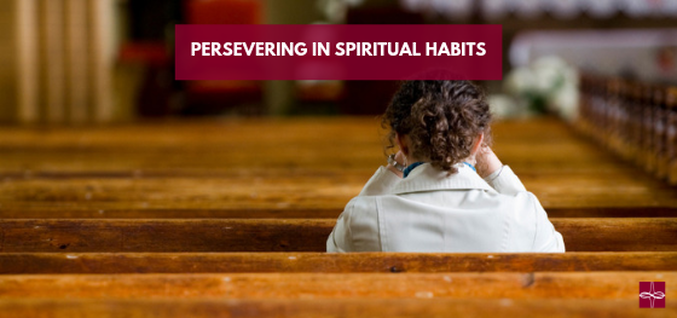



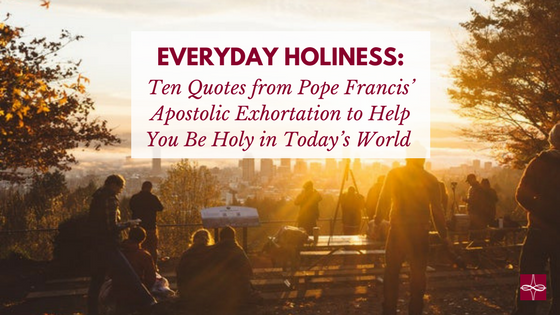

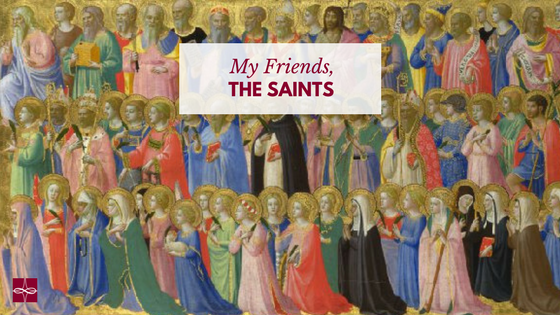

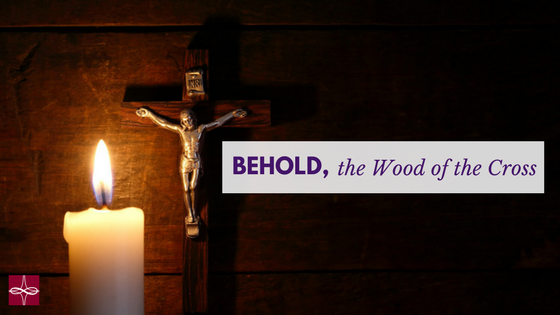

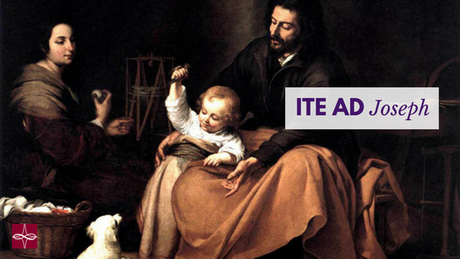

 RSS Feed
RSS Feed